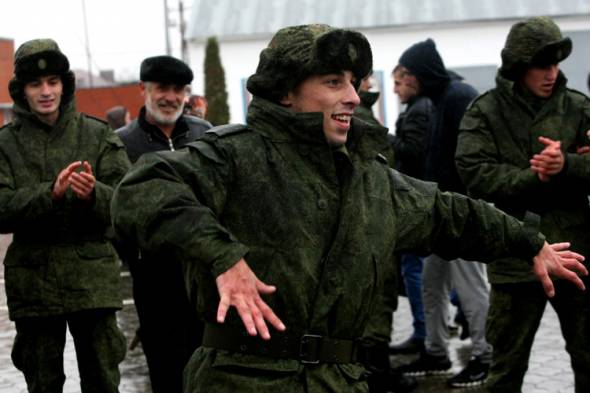
Moscow May Not Be Able to Count on North Caucasians Any Longer to Fill Draft
Publication: Eurasia Daily Monitor Volume: 19 Issue: 56
By:

Moscow has long counted on young males from the North Caucasus to ensure that each seasonal Russian military draft is filled. Men from that region typically view military service as a social lift out of the extreme poverty most find themselves in, a way of displaying solidarity with their comrades who have chosen a life in uniform, and even as a manifestation of the martial traditions that many peoples in that region do not want to give up. One consequence of that is that North Caucasians are overrepresented in the Russian military, a pattern that puts them at risk of being the first victims of any serious conflict (see EDM, March 1). In the case of Ukraine, soldiers from the North Caucasus have been among the first to die; and their deaths are having an impact not only on the attitudes of their families and home republics about the war and military service in general, but also on Moscow and its approach to Ukraine and the military.
In Dagestan alone, the most populous of the republics in that region, Russian officials have acknowledged that more than 60 local men have died in Ukraine; but republic journalists say the real number is over 100, a figure that means Dagestan has lost more soldiers in Ukraine than any other non-Russian republic—and by a large margin over the next largest, Buryatia (Kavkazr.com, March 15, 23). These deaths have left Dagestani society deeply divided, Meduza commentator Vladimir Sevrinovsky writes. Some locals view the dead as heroes whose demise must be revenged, but others now argue that those individuals were foolish to join the Russian army to fight this war because it has nothing to do with them. Many Dagestanis contend they are ready to fight against an invader but not to defend a government that invades someone else and seems more concerned about standing up for the owners of luxury yachts than helping its own population at large. One local mother told Sevrinovsky that if she had known what was going to happen, she would have sought to keep her son from serving in the Russian military (Meduza, April 10).
This same woman made a point that is often neglected in assessing the attitudes of North Caucasians and others about wars; yet such a view may ultimately prove decisive in the Russo-Ukrainian conflict and others. Namely, she said she does not understand how the Russian state could have taken her only son away. In the past, men who were only children in their families were exempted from the draft, but that is no longer the case. Given that families in Dagestan and elsewhere are now smaller due to natural demographic shifts, Moscow in the short term at least may have no choice but to also go after such people. But families that lose their only child are far more likely to react negatively than are those that have two or more progeny. Moreover, only children themselves are less likely to be willing to become soldiers than if they had more brothers and sisters (Meduza, April 10).
In response, and because President Vladimir Putin has publicly claimed that draftees will not be sent to fight in Ukraine (a promise that seems not to have been kept so far), the Russian Armed Forces have had to make an important shift. Instead of relying on the draft in Dagestan, the military is now seeking to attract men there to contract service. Notably, however, these kontraktniki are legally allowed to be sent into “hot spots.” Some evidence suggests the Russian military has been successful in this shift—but only by spending what in the North Caucasus amounts to astronomical sums to encourage local young men to sign up. News agencies report some 300 Dagestanis have done so this year, twice the number from a year ago but far fewer than what regular conscription would have called for (Riadagestan.ru, March 18; Chernovik.net, March 11).
And in recent days, more dramatic developments have suggested that Moscow faces much more opposition to military draft and recruitment policies in the North Caucasus than many had assumed. According to numerous sources, more than 100 Muslim prisoners from neighboring Chechnya and Ingushetia, held in a Dmitrovgrad detention center, slashed their veins to protest what they described as tortures and taunts from their jailors. They were supported by more than 100 other inmates (T.me/NetGulagu, April 14; Fortanga.org, Idel-Ural.org, The Chechen Press, April 15).
Reportedly, the prison guards taunted them with the threat that they could be sent to Ukraine to fight and die, words that infuriated North Caucasians. Such revelations are sure to even further limit the numbers of people from that restive region willing to join the Russian military and fight in Ukraine (Idel-Ural.org, April 15). As such, Moscow will be under more pressure to do away with the draft and shift to a fully professional army. Yet this will compound the challenges to the Russian Armed Forces’ top brass, who are used to commanding a mass force (see EDM, April 11), as well as additionally strain the Russian defense budget.
Sooner rather than later, some in Moscow will likely begin to recognize that Putin’s war in Ukraine is coming home to roost, and in precisely the place where Russian forces have had to fight for so long and so hard—the restive North Caucasus. If that recognition spreads, a seemingly local problem with finding enough conscripts there could well transform Russian policy as a whole.



